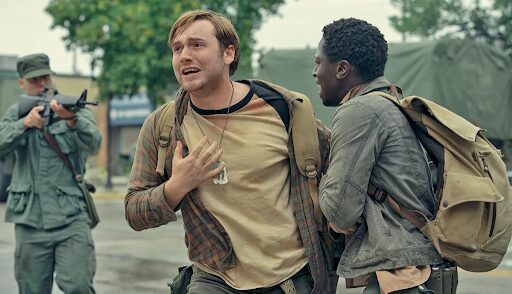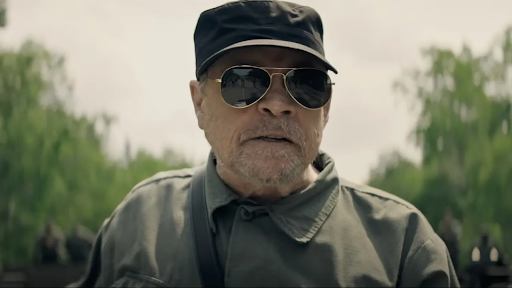Francis Lawrence’s THE LONG WALK has been heavily touted as “The Movie of the Moment.” It is easy to understand why. The film centers on a televised competition in which one boy from each state is forced to take part in an indefinite jaunt through the American countryside. If their pace slows below three miles per hour, they are warned. If they’re warned three times, they are brutally executed as the others are forced to trudge forward. As Mark Hamill’s scowling marshall imparts, “There is one winner and no finish line.” That statement certainly rings true. Every day in 2025, America spirals us closer to an unapologetically authoritarian society. Donald Trump and his cronies are making active moves to silence and punish all dissent ranging from left-wing organizations to harmless late-night talk show hosts. The hatred towards those seen as “other” is so public that the Department of Homeland Security is actively developing a reality show where immigrants compete for citizenship. Micro-budget televised spectacles of suffering are no longer a fictional construct. In the meantime, we’re so inundated with daily gun violence both from citizens and the state that one has to wonder if anyone would bat an eye at a live execution on CNN if enough people could be brainwashed into wanting to see it. In the face of such despair and threat, it does feel like the only solution is to keep walking, hoping that eventually the sounds of carnage will become quiet enough to tune out.
However, one stark difference from our current world order constantly reminded me that I was in fact safely inside the “movie world” when watching THE LONG WALK. This group of young men, who come from a litany of cultural and racial backgrounds, are for the most part emotionally grounded, caring, and heroic. The only true troublemaker, Gary (Charlie Plummer), emerges early on, but his wrath does not seem to have a charged motivation beyond general insecurity and fear. He’s an equal opportunity bully. After he gets a contestant killed by taunting him and knocking him over, Gary is by and large rejected by the rest of the group until reality sets in and he starts to calm down. The majority of the film centers on an inspiring, galvanizing friendship between Ray (Cooper Hoffman), Peter (David Jonsson), Hank (Ben Wang), and Arthur (Tut Nyuot). The palpable bond between them isn’t just a way to rationalize what is happening to them, it is an act of defiance. They often physically carry each other when sleep starts to take hold or when legs give out. It is a captivating, moving insistence on shared survival for as long as possible.

The film adapts a 1979 Stephen King novel, and as such, these boys fall into tropes of masculinity that would be faced with a more quaint, late-20th-century concept of dystopia. It is a story steeped in post-Vietnam ideology. It genuinely believes that a band of brothers would protect each other through any and all adversity, even if there are squabbles along the way. In the decades since, these ideas have been deeply ingrained in pop culture. Men’s public camaraderie and understanding towards one another was framed as endearing for so long that it often became a shield for abusive behavior towards their partners or bigoted points of view that became shrunken down to points of debate. The film is largely frozen in time, with little-to-no mention of the Internet, social media, smartphones,or other technological advances that are now used to shape ideology and alliance. However, in an age where young boys are raised by self-help gurus and right-wing political pundits inside of their tablets, that veil is starting to slip.
If THE LONG WALK was truly a reflection of today’s world, these characters would be so insufferable that the audience would be secretly hoping for them to get shot. It would be a group of socially inept, chronically online pod people. Half would be physically incapable of walking more than five miles because they never venture outside, and the other half would be absurdly fit, since their guru told them to devote their entire sense of self worth to their physical form. As they walked down that lonely road, tribalism would ensue within minutes. All of the right-wing white boys would identify who belongs to their preferred radicalized cult and unendingly enact hate towards anyone outside of that group. Some would remain quiet and stick to the back of the pack, insisting that they are not involved with any side of the conflict. Perhaps a guy or two would step in to defend one of the more vulnerable contestants, but by standing still to guard their bodies, the guards would make short work of them. Meanwhile, the more marginalized in the group would perhaps try to bond, but their alliance would be branded as a threat to the Long Walk just for existing and would likely get snuffed out so that the middle-class viewers at home don’t get too scared.

I’m not suggesting this change would’ve inherently made THE LONG WALK a better movie. As is, it is a suspenseful, well-written, and beautifully acted film; a tragic story with a sweet side, which is refreshing, albeit a bit saccharine. However, I will be among the last people who remember that men are capable of acting this way. It was a wistful experience in which I found myself remembering my college days when I felt more hopeful about my generation’s chances of overcoming the world’s litany of challenges as we looked down the barrel of Trump’s first term. While I have hope that good may someday prevail over evil someday, I am not optimistic that our culture will ever recover.
Stories where men are vulnerable and caring will likely soon be dismissed as dadcore or “unc” movies. As someone who will soon be entering that demographic, I enjoyed THE LONG WALK very much. Francis Lawrence, who helmed all of the sequels to THE HUNGER GAMES, was an inspired choice to direct. The film plays as a bleaker, more realistic take on the YA apocalyptic adaptations of my teenage years, which are now long gone. This current 18-24 male demographic demands callousness, violence, and bigotry. We will likely see a new wave of films that whitewash the carnage our country and its allies have inflicted and demean or erase all groups of people and points of view that are perceived as “woke” or “radical left.” Being openly guided by human emotion instead of online content or your AI therapist will become a subculture, and a big handful of the few remaining men who currently have a backbone will become cynical and conservative. The movies will eventually acknowledge these truths, but it might be too late.
















I found the review insightful, particularly the contrast between the films outdated ideals and todays toxic masculinity. The critique feels relevant yet slightly pessimistic about future storytelling.